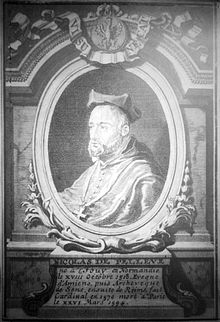Nicolas de Pellevé
Nicolas de Pellevé , also Nicolas de Pellève (born October 18, 1515 in Jouy-sous-Thelle , † March 28, 1594 in Paris ) was a French clergyman, Archbishop of Reims and cardinal .
Life
Born as the son of the noble Charles Malherbe, lord of Jouy and Ribets, and his wife Hélène du Fay, he came from an old Norman family. He studied law and scripture at the University of Bourges . He later became a law professor at the same university. He was an advisor at the court of King Henry II of France and the Parlement of Paris. He joined Cardinal Charles de Lorraine-Guise , who promoted his advancement and gave him a benefice as Commendatar Abbot of Saint-Corneille de Compiègne .
On August 24, 1552 Nicolas de Pellevé was appointed Bishop of Amiens . King Henry II sent him to Scotland in 1559, together with several scholars from the Sorbonne , to convert the Presbyterians there by conviction or violence, but the Scottish Protestants received support from Queen Elizabeth I of England. De Pellevé returned to France, where he managed to reach a peace treaty during the reign of King Francis II .
In 1562 he exchanged the diocese of Amiens as a benefice for the Abbey of Saint-Julien des Echelles in Tours , but until May 18, 1564 he kept the title of Bishop of Amiens. On December 16, 1562 he was appointed Archbishop of Sens . From February 15, 1563 until the end of it, Nicolas de Pellevé took part in the Council of Trent and contradicted the Gallican tendencies in the French clergy.
For Cardinal priest pope elevated him Pius V in the consistory of 17 May 1570 the cardinal's hat and the title of Santi Giovanni e Paolo received Nicolas de Pellevé on July 4, 1572. At the conclave in 1572 , in which Gregory XIII. was elected Pope, he did not participate. He became Prefect of the Congregation for Bishops and Regulars . On November 14, 1584 he opted for the title of Santa Prassede . Nicolas de Pellevé was a participant in the 1585 conclave , which Pope Sixtus V elected. He also took part in the first conclave of 1590, in which Urban VII was elected. He also took part in the second conclave of the same year, from which Gregory XIV emerged as Pope.
Nicolas de Pellevé became one of the most influential figures in the Catholic League . In 1585 he was among the 25 cardinals who co-signed the Bull Sixtus' V, through which King Heinrich III. excommunicated by Navarre and denied his right to the French throne. Heinrich protested violently against this, questioned the legitimacy of the Pope and threatened to convene a free council to which evidence of the Pope's heresy should be presented. The king collected all proceeds from the cardinal's benefits, so that the latter was dependent on the support of the league and the pope. At the end of 1587 the king lifted the confiscation of the proceeds.
On May 10, 1591 Nicolas de Pellevé was appointed Archbishop of Reims, on October 4, 1592 he took possession of the archbishopric. He took part in the conclave of 1591 , the Innocent IX. elected to the Pope. He was also present at the conclave in 1592 when Pope Clement VIII was elected. Nicolas de Pellevé was chairman of the league's council and chaired the assembly of clergy when the league conducted the états généraux of 1593 in Paris . The cardinal stayed in Paris and fell ill when King Henry IV, whom he had always fought, moved into the city on March 22, 1594. The king had the cardinal assure his protection and sent archers from the royal guard. However, the disappointment that befell the cardinal at Heinrich's enthusiastic reception in Paris worsened his condition.
Nicolas de Pellevé died six years later at the age of 79 in Paris and was buried in the church of the Coelestines. In October 1598 his remains were transferred to Reims and buried in the local cathedral .
literature
- Honoré-Jean-Pierre Fisquet : Nicolas Cardinal de Pellevé (1562–1592). In: La France pontificale (Gallia Christiane). E. Repos, Paris, pp. 125-128.
Web links
- Pellevé, Nicolas de. In: Salvador Miranda : The Cardinals of the Holy Roman Church. ( Florida International University website), accessed December 9, 2018.
- Entry on Nicolas de Pellève on catholic-hierarchy.org ; accessed on December 9, 2018.
| predecessor | Office | successor |
|---|---|---|
| Louis II. De Lorraine-Guise |
Archbishop of Reims 1592–1594 |
Philippe du Bec |
| Louis I. de Lorraine-Guise |
Archbishop of Sens 1562–1588 |
Renaud de Beaune |
| François de Pisseleu |
Bishop of Amiens 1552–1562 |
Antoine de Créquy |
| personal data | |
|---|---|
| SURNAME | Pellevé, Nicolas de |
| ALTERNATIVE NAMES | Pellève, Nicolas de |
| BRIEF DESCRIPTION | French clergyman, archbishop of Reims and cardinal |
| DATE OF BIRTH | October 18, 1515 |
| PLACE OF BIRTH | Jouy-sous-Thelle |
| DATE OF DEATH | March 28, 1594 |
| Place of death | Paris |
